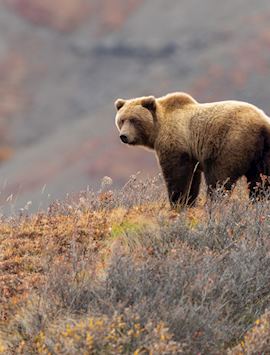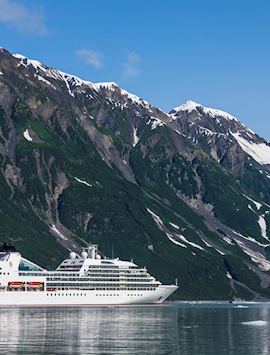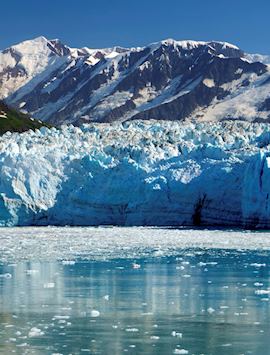By Canada and Alaska specialist Jon
Sheer, snow-capped mountains leading down to glacier-strewn waters teeming with whales. A night sky alive with the many-hued dancing waves of the northern lights. Bears lumbering through the forest and along the shoreline in search of their next meal. There’s so much to see on a trip that combines Canada and Alaska, especially if you’re eager to get off the beaten track. That’s why it’s a pairing I love to recommend to seasoned travelers, or those who’ve been to either destination before and would like to experience something different on their next trip there.
Why combine Canada & Alaska?
The fact that the destinations share a border makes western Canada and Alaska a natural pairing for travelers. Their proximity means the two have plenty in common — including immense tracts of pristine wilderness, abundant wildlife, and shared gold-rush history — but each adds something distinct to your trip.
In Canada, cosmopolitan cities like Vancouver sit within easy reach of forested hiking trails and sandy beaches. Meanwhile, with national parks larger than some European countries, the vast expanse of Alaska just blows you away.
Below, you’ll find some of my favorite Canada and Alaska vacation ideas. Of course, these are only suggestions, and I can create a bespoke trip for you to these destinations based around your passions.
1. Wildlife spotting in Canada & Alaska
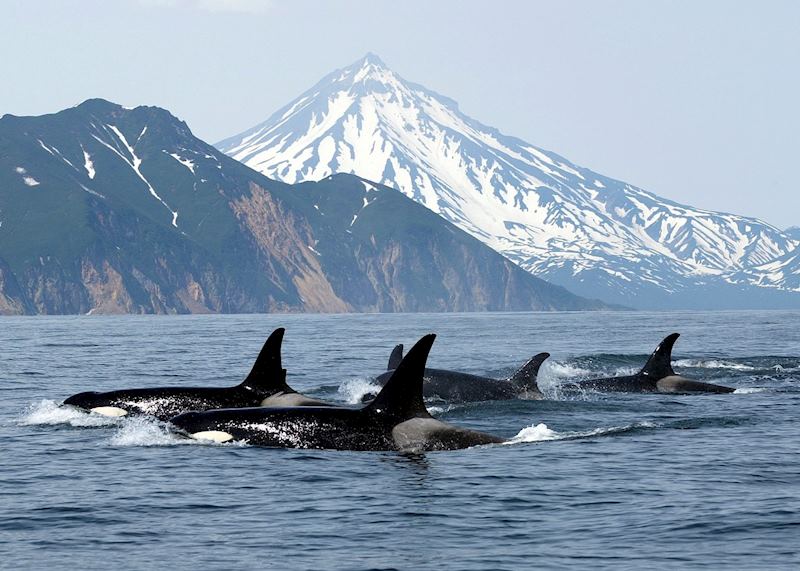
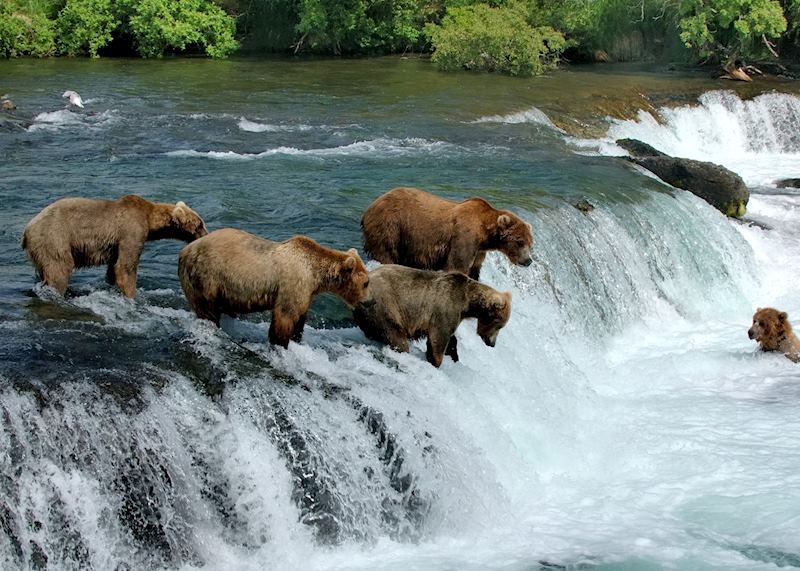
A group of grizzly bears swipe at a salmon-filled stream with powerful paws. The shiny, black-and-white bodies of a pod of orcas curve above the ocean’s surface, sending sprays of water toward the sky. An ungainly moose wanders across the road in front of you. Seeing endemic wildlife is one of the main draws for visitors to both Canada and Alaska, and a combined trip gives you the opportunity to encounter all sorts of different species.
Starting in Canada, I can arrange for you to stay in a bear lodge in British Columbia’s Great Bear Rainforest to see these animals up close in their natural environment. Here, you’ll reside in a comfortable, rustic cabin and head out with expert guides to strategically placed viewing platforms to watch the bears from. The annual salmon run is one of the best times to go, as the usually solitary grizzlies are drawn to the rivers for a feeding frenzy. As well as bears, you might spot moose, bald eagles, foxes, elk, and even wolves if you’re lucky.
You can also see bears on a day trip, and I found those in Alaska to be the most memorable because of how immersive they are. For example, from Homer, you could fly in a seaplane over volcanos and glaciers to Katmai National Park. After landing on the beach, your guide will lead you along the coast and through meadows to walk among the bears for a truly captivating experience.
It’s not all about the land mammals though. On a combined Canada and Alaska vacation, you’ll have plenty of chances to see marine life, too. Whale watching boat trips from both destinations give you a high likelihood of spying orcas, humpbacks, and minke whales, as well as sea otters, seals, sea lions, and porpoises.
2. Canada & Alaska cruise
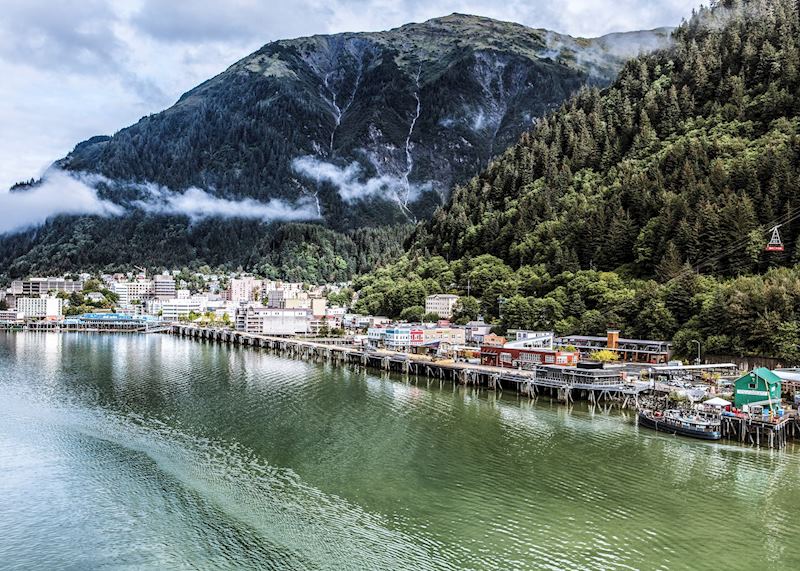
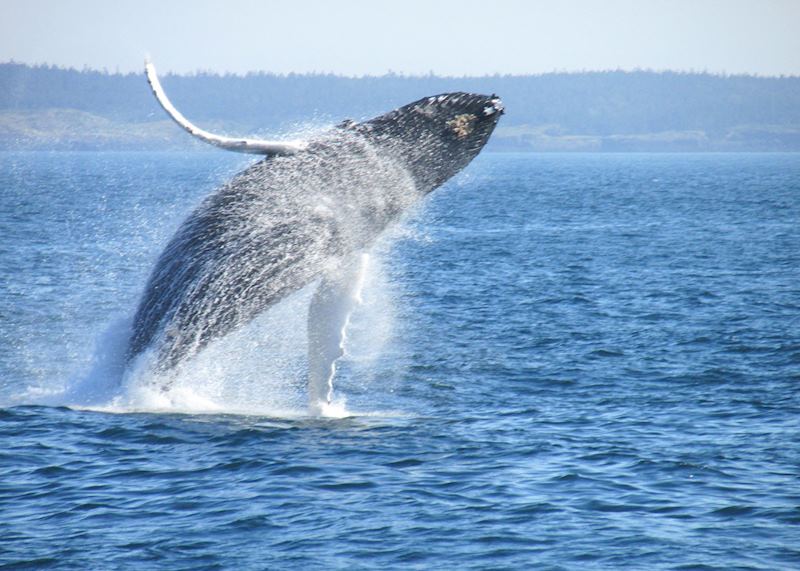
Gliding past snow-capped mountains, listening to the creak of calving icebergs, watching humpback whales breach the dark surface of the ocean… a cruise combining Canada and Alaska allows you to relax in comfort as you take in the region’s remote landscapes.
Your voyage begins in Vancouver, and I recommend spending a few days exploring the city before setting sail. That might mean cycling the trails that weave through Stanley Park, discovering the gastronomic delights of the Gastown district, or viewing the sunset over the water at English Bay. There’s also the option to fly into Calgary instead and journey to Vancouver on the luxurious Rocky Mountaineer train, gazing at the region’s towering peaks and mirror-like lakes through the large windows.
Once on board your ship, your captain will navigate along the coastline of British Columbia and Alaska’s Inside Passage. You’ll float through ice-strewn waters, where you might spy whales and dolphins frolicking in the waves or witness huge chunks of glaciers break loose and crash into the sea with a roar.
Along the way, you’ll dock in several towns for the chance to explore on land. You could hike across the Mendenhall Glacier in Juneau, visit the raptor rehabilitation center in Sitka to observe majestically plumed bald eagles up close, or soar above the sheer granite cliffs and plunging waterfalls of the Misty Fjords National Monument in a light aircraft.
Your final port of call is Anchorage, the largest city in Alaska. Here, you can stroll around excellent museums like the Alaska Native Heritage Center and Anchorage Museum, trek to the summit of Flattop Mountain, or take a flightseeing tour of Denali National Park to see the soaring peak of Mount Denali and the winding route of Ruth Glacier’s Great Gorge.
3. Adventure & history in Alaska & the Yukon
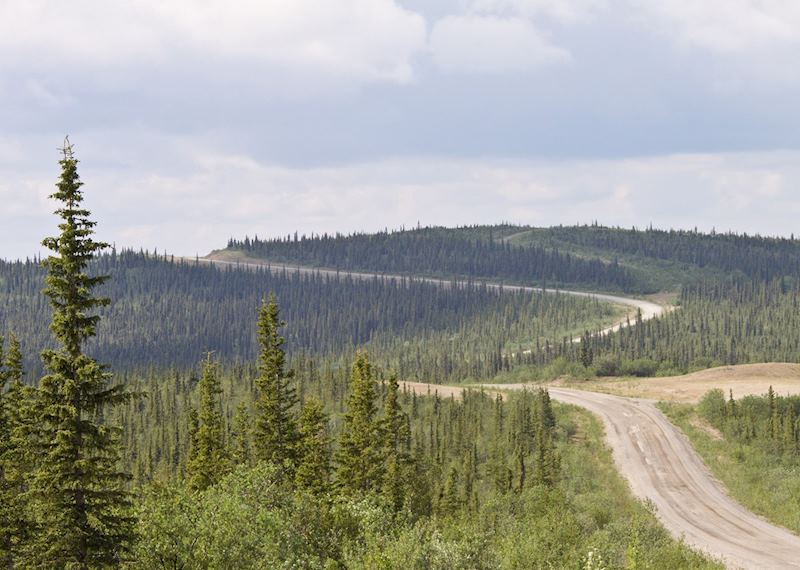

With their vast swathes of raw wilderness and time-locked gold-rush towns, eastern Alaska and the neighboring Yukon Territory in Canada complement each other well if you want to get off the beaten track during your travels.
Here, the population is small and settlements few and far between, so a car is the only convenient way to get around. Part of the trip sees you drive along the Top of the World Highway, a gravel road that winds its way across the crests of mountain ridges and through the northernmost border crossing in North America. The latter is little more than an officer in a small hut, which makes for quite a unique immigration experience!
As you journey past meandering rivers and fir-dotted slopes, you’ll be chasing the ghost of the Klondike Gold Rush on the streets of frontier towns steeped in history. In Canada, you can stroll along the wooden boardwalks of Dawson City past traditional saloons and false-fronted houses, or pan for gold at nearby Bonanza Creek.
Across the border in Alaska, you might like to tour the preserved town of McCarthy and abandoned Kennicott copper mine, where you can still see the workers’ discarded machinery and personal belongings. I can also arrange for you to indulge your sense of adventure with a guided hike on the icy expanse of the Root Glacier, past turquoise pools and deep ravines.
If you’d like the chance to spot some wildlife on this Canada and Alaska trip, I recommend visiting the Yukon’s Kluane National Park. Its grassy valleys and precipitous mountains are home to numerous species, including grizzly bears, moose, lynx, wolves, bald eagles, arctic terns, and wolverines.
4. A winter vacation to Canada & Alaska


From the deep snow that blankets the mountains and crunches beneath your feet to the elusive and ethereal beauty of the northern lights dancing overhead, winter in Canada and Alaska is mesmerizing. And those happy to brave the cold temperatures will find a wealth of exhilarating activities waiting to be experienced.
I’d recommend starting your trip in British Columbia. From Vancouver, you could head up to Whistler to spend some time skiing or snowboarding, or hop on a snowmobile to carve your way through snowdrifts in the backcountry. Alternatively, speed down a tree-lined creek behind your own pack of huskies. If you’re feeling particularly adventurous, you might like to try scaling the icy cascade of a frozen waterwall in Jasper, Alberta with ice picks and crampons.
Next, you continue your journey to Alaska, in search of the northern lights. Although unpredictable, the best time to witness their rippling colors is between midnight and 3am. For the brightest displays, you want to be far away from any light pollution. That’s why I’d suggest staying in a specialist lodge like Borealis Basecamp outside Fairbanks. Here, you’ll sleep beneath a transparent dome so you can gaze up at the star-studded night sky — and hopefully the lights themselves — from the comfort of your bed in addition to seeing them from the viewing platform.
Don’t think you’ll be spending your days just waiting for night to fall, though. The lodges have plenty of daytime experiences on offer, from dog sledding and snowmobiling tours to reindeer feeding and photography classes.
5. Combining Canada, Alaska & Hawaii

One way to extend your Canada and Alaska vacation is to add on some time in another part of the US. Seattle and other cities in the Pacific Northwest are great options thanks to their proximity to Vancouver. However, one of my personal favorite ideas is to end your travels in Hawaii for some sunshine and beach time. This itinerary gives you the chance to compare the culture, cuisine, climate, and countryside of these very different regions.
You can catch a direct flight from Vancouver or Anchorage to Honolulu, making it easy to reach the islands from both Canada and Alaska. Once there, you could contrast your time hiking on glaciers and through bear-inhabited forests in the far north with a trek across the dark, bubbling lava fields of Hawaiʻi Volcanoes National Park.
Similarly, having watched marine life from the deck of a boat in Canada and Alaska, in Hawaii you can slip into the warm waters to snorkel alongside kaleidoscopic tropical fish, graceful sea turtles, and elegant manta rays. And while you may not be able to see the northern lights this far south, you do have the opportunity to stargaze with expert guides from the observatory at the summit of Mauna Kea.
Best time to visit Canada & Alaska
The best time to take a combined Canada and Alaska vacation is between mid-June and mid-September. During these months, the days are long and the temperatures are generally pleasant. June and July are particularly good months for wildlife viewing in Alaska, while Canada’s salmon run in September attracts large numbers of bears.
If you’re hoping to see the northern lights, winter gives you the highest probability of witnessing their luminescent ribbons flickering across the night sky — just make sure you pack for cold weather.
Read more about trips to Canada & Alaska
Start thinking about your experience. These itineraries are simply suggestions for how you could enjoy some of the same experiences as our specialists. They're just for inspiration, because your trip will be created around your particular tastes.

